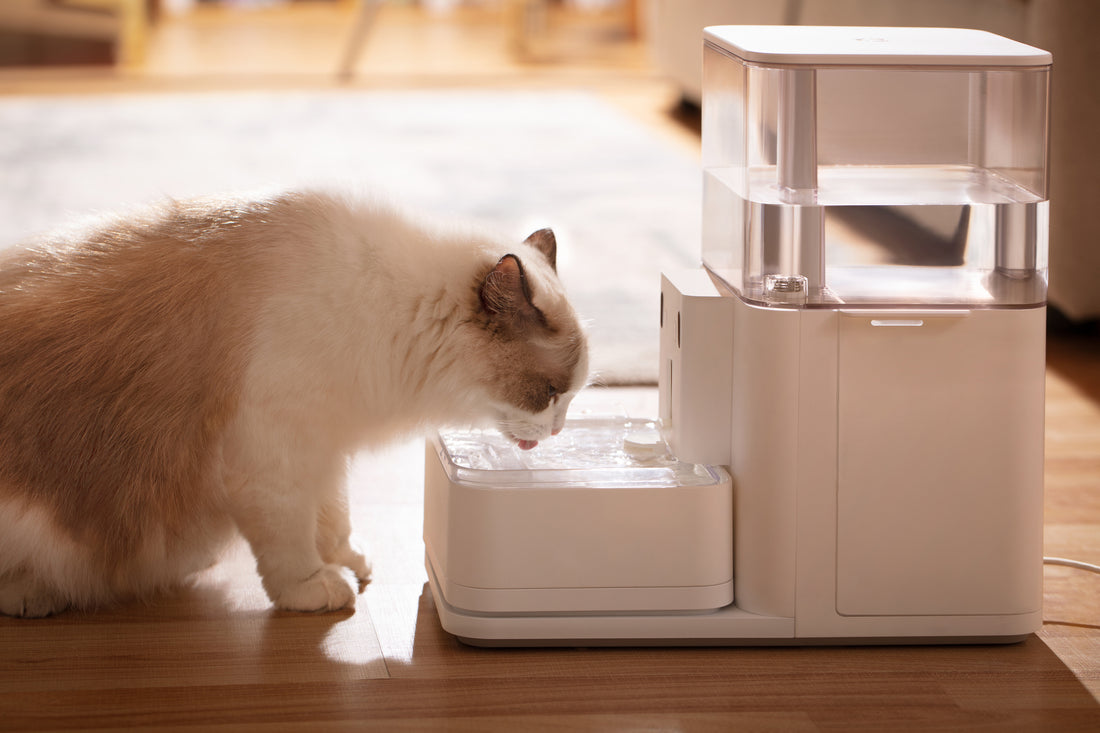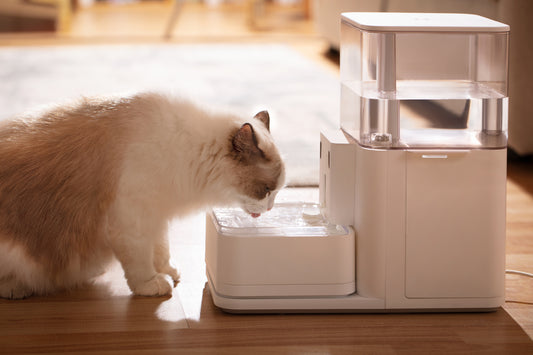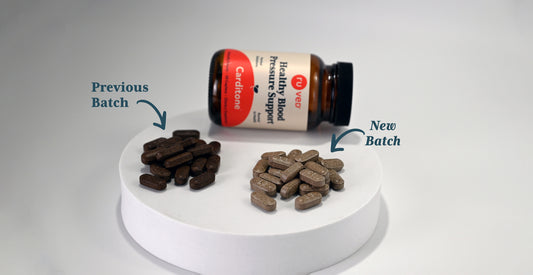By: Laurie Dohmen, VMD, MS, RH (AHG), FACVBM
Physiologically, cats are funny creatures. They are what are called “obligate carnivores.” This means that they really only need to eat other animals (this is not just meat, but all parts of the prey, including the veggies in the stomach). They are missing enzymes that most other mammals have to process certain things. This is why both Tylenol and essential oils can kill them. Most mammals process everything they ingest in either the liver or the kidneys. The missing enzymes are primarily in the liver, but feline kidneys are different too. They are missing what I call an “off switch.”
keeping your feline family well-fed & hydrated:
In most species, if nothing is flowing through the kidneys that needs to be processed, the kidneys are just resting. In cats, the kidneys are always processing something, so if there is nothing else to process, the kidneys will process their own tissue! This is a major reason I recommend always having food out for cats (unless they have a medical condition such as obesity or diabetes that makes free-feeding more dangerous). If cats have the ability to eat at any time, they keep food flowing through their kidneys so the kidneys don’t digest themselves.
Another great trick for cats is to make sure there is plenty of moisture in their diet. Fresh water is obvious, but wet food is great and putting the liquid from canned meats, such as tuna in the water bowl is like giving humans fruit-flavored water. (Remember to make sure there is no salt or other flavors, the juice should be from just meat in water.)
natural supplements for healthy kidneys:
So clearly, taking care of your cats’ urinary system is of paramount importance. Fortunately, along with a nutritious diet and plenty of water, there are herbs we can use to support the urinary tract. (These herbs are great for any species, by the way!)
One of the primary urinary conditions in cats, especially male cats, is stones, which can cause the animal to be unable to urinate. Plus, stones are extremely painful! Simply put, the stones are due to a buildup of debris in the urinary tract, so this is another reason to keep everything flowing smoothly. [bk1]
cranberries & blueberries:
One common supplement given to our pets to support urinary health is cranberries (Vaccinium macrocarpon) or blueberries (V. corybosum). Vaccinium berries have many wonderful actions for the urinary tract. Not only do these berries change the pH of the urine, but they also have been shown to promote healthy urinary tract microflora. (1) (2). They lower the pressure of the fluid flowing through the kidneys which puts less pressure on kidney tissue. This helps to maintain healthy blood pressure. (3). These berries are also antioxidant to the metabolites that naturally pass through the kidneys (4). This helps prevent kidney tissue injury and scar tissue buildup over time (5). The berries’ last superpower is that they are considered probiotic, both to the intestines and the urinary tract itself (6). This allows the beneficial bacteria the body needs to outnumber suboptimal bacterial species.
varuna & pasanbheda:
Another herb that is less commonly used in the US, but is a great Ayurvedic herb is varuna (Crataeva nurvala). Varuna bark has long been known for its use to protect the urinary tract, especially the kidneys (7). One of the ways in which varuna accomplishes this is by helping the kidneys flush minerals, such as calcium, phosphorus and magnesium (8). Basically, varuna is useful to support all aspects of the urinary tract (9). I use it in female dogs that have occasional urinary control issues after being spayed with great success.
Another specifically Ayurvedic herb that is generally used in formulas is pasanbheda (Didymocarpus pedicellata). Its leaves are antioxidant and protective of the kidneys. When faced with stress on the kidneys , pasanbheda protects and nourishes the kidneys. (8).
The extra nice thing about cranberries and other Vaccinium berries, varuna and pasanbheda is that they are generally safe herbs for long-term use.
puncture vine:
Puncture vine (Tribulus terrestris) is used in almost every medicinal culture, from Ayurveda to Unani to Traditional Chinese Medicine. It is even discussed by Dioscorides (2000 translation): “The seed (taken in a drink when it is new) helps stones {urinary, kidney}. (10)” In the US, puncture vine is primarily used for reproductive support, especially for men. In Ayurveda, it is used for both reproductive support as well as for the urinary tract. It is nourishing and strengthening to the kidneys, and increases urine output (8). It is also cooling and soothing to the tissue of the urinary tract. Puncture vine has been shown to help maintain healthy kidney pH and overall kidney longevity (8). The only drawback to puncture vine is that it does have some precautions: do not use during pregnancy and lactation, sheep and goats eating this plant get photodermatitis and staggers, and caution in diabetics (11).
kidneys are vital to your cat's health:
Overall, there are a variety of great herbs to support the urinary system and especially the kidneys in cats and all our companion animals. We can use them individually, in formula, and for long periods of time. When herbs are mixed with appropriate diet and other living conditions, cats’ kidneys can function properly until old age.
References:
- Pectic Oligosaccharides from Cranberry Prevent Quiescence and Persistence in the Uropathogenic Escherichia coli CFT073. Sun, J, et al. 2019, Scientific Reports 9, p. 19590.
- Cranberry-derived Proanthocyanidins Induce a Differeintial Transcriptomic Response within Candida albicans Urinary Biofilms. Sundararajan, A, et al. 2018, PLoS ONE 18 (8), p. e0201969.
- A Blueberry-Enriched Diet Attenuates Nephropathy in a Rat Model of Hypertension via Reduction in Oxidative Stress. Elks, C., et al. 2011, PLoS ONE 6 (9), pp. 1-10.
- Pterostilbene, a Bioactive Component of Blueberries, Alleviates Renal Fibrosis in a Severe Mouse Model of Hyperuricemic Nephropathy. Pan, J, et al. 2019, Biomedicine and Pharmacotherapy 109, pp. 1802-1808.
- Lingonberry (Vaccinium vitis-idaea L.) Fruit as a Source of Bioactive Compounds with Health-Promoting Effects - A Review. Kowalska, K. 2021, International Journal of Molecular Sciences 22, p. 5126.
- Cranberry Polyphenols and Prevention against Urinary Tract Infections: Relevant Considerations. de Llano, D, Moreno-Arribas, M and Bartolome, B. 2020, Molecules 25, p. 3523.
- Protective action of Crateva nurvala Buch. Ham extracts against renal ischaemia reperfusion injury in rats via antioxidant and anti-inflammatory activities. Choucry, M, Khalil, M and El Awdan, S. 2018, Journal of Ethnopharmacology, Vol. 214, pp. 47-57.
- Sodhi, Virender. Ayurvedic Herbs. Bothell, WA : Book Publishers Network, 2014.
- Botanical description, phytochemistry, traditional uses, and pharmacology of Crataeva nurvala Buch. Ham.: an updated review. Kumar, D, Sharma, S and Kumar, S. 113, 2020, Future Journal of Pharmaceutical Sciences, Vol. 6.
- Dioscorides. De Materia Medica. Johannesburg : Ibidis Press, 2000.
- Materia Medica: Reproductive Herbs. Dohmen, L. s.l. : Purple Moon Herbs and Studies, LLC, 2022. Veterinary Herbal Apprenticeship and Retreat.




